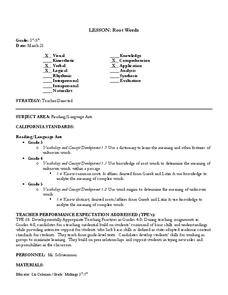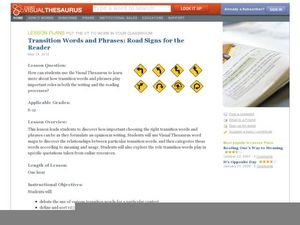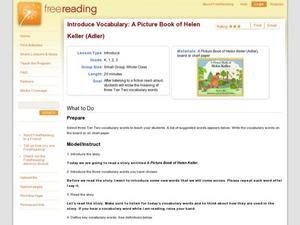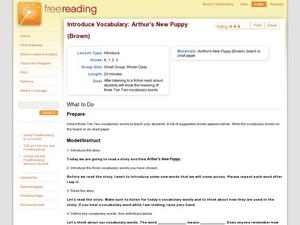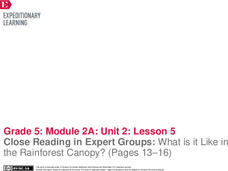EngageNY
Launching The Performance Task: Building Background Knowledge: “War in the Pacific,” Part 1
It's all about a bit of give and take. Scholars silently read War in the Pacific and circle any unfamiliar words. Using context clues, they write each word on a strip of paper along with the inferred definition. After looking the word up...
Meadows Center for Preventing Educational Risk, University of Texas at Austin
Lesson 10 - Compound Words
Individually, words have power, but when added together, they can take on a whole other level of meaning. Readers learn about compound words in the 10th of 17 lessons of the Word Recognition and Fluency series. A script provides guidance...
Curated OER
Using Prefixes, Suffixes and Root Words to Improve College Level Vocabulary
Grow vocabulary skills with an understanding of affixes and word roots. Included here are a few activities and plenty of materials you can use to support your learners as the focus on building vocabulary.
West Contra Costa Unified School District
Square and Square Roots
Root for your pupils to learn about roots. Young mathematicians first review the meaning of squares and square roots. They then use this knowledge to simplify square roots of monomials with variables.
Literacy Design Collaborative
Words Matter: Diction and Orwell's "Shooting an Elephant"
Watch your tone! Scholars analyze how diction in George Orwell's Shooting an Elephant contributes to the tone of the text. Readers watch a video, participate in a word splash, and work through a PowerPoint lesson to help them determine...
Curated OER
Commonly Mixed Pairs of Words
In this word meanings worksheet, students practice choosing the correct word for the sentence. Students complete fifteen sentences by choosing the correct word for each sentence.
Haut Gap Middle School
Root Words
Scholars demonstrate their knowledge of root words aqua and aud, and develop vocabulary skills by completing of a chart, handout, and worksheet using creative thinking skills, a dictionary, and a thesaurus.
Curated OER
Dictionary Guide Words: How Do They Guide Us?
Fourth graders, after brainstorming what the word "guide" means, examine how to use guide words in a dictionary to locate words. They define "guide," identify guide words in a variety of dictionaries and locate words using guide words....
Curated OER
Transition Words and Phrases: Road Signs for the Reader
Therefore! However! Furthermore! Explore the power of transition words and phrases. Signal your readers by suggesting the relationship between different thoughts or points. Help them demonstrate an understanding of word relationships.
Curated OER
Word Walls
Students participate in creating a word wall using words important to them and design other organized displays to entice memory and assist in teaching. As a class, they clap out letters of words and solve mystery words from given clues....
Curated OER
Shades of Meaning
Examine and distinguish between words that have similar definitions but different connotations. Middle schoolers define connotation and denotation and participate in a "shades of meaning" contest in small groups. Groups use the Visual...
Curated OER
Spanish-English Cognates in the ELL Classroom: Friends or Foes?
Define the meaning of a cognate and use the concept to help Spanish-speaking ELLs connect their first language to English. Middle schoolers explore Latin roots to find cognates in both languages. They relate the Spanish and English word...
Curated OER
Introduce Vocabulary: A Picture Book of Helen Keller (Adler)
The story of Helen Keller is a fascinating one for young scholars; use it to practice reading comprehension and new vocabulary as learners listen to you read David Adler's picture book (hint: this strategy can be applied to any book)....
Curated OER
Introduce Vocabulary: Alexander, Who Use to be Rich Last Sunday (Viorst)
Although this vocabulary-in-context activity is focused on Judith Viorst's book Alexander, Who Use to Be Rich Last Sunday, the strategy can be applied to any book budding learners read with you. First, introduce the three new words you...
Curated OER
Introduce Vocabulary: Arthur's New Puppy (Brown)
Learn new words as you read Marc Brown's story, Arthur's New Puppy. This is focused as a vocabulary-in-context activity (though this strategy could be used with any book and set of words). Introduce the new words you will focus on:...
Institute for the Professional Development of Adult Educators
Using Context Clues with Signal Words
When you come across an unfamiliar word in a text, do you skip it and move on? Practice using context clues to identify words you don't know with a thorough set of language arts lessons. The resource reinforces close reading and critical...
Brigham Young University
Rosencrantz and Guildenstern Are Dead: Word Squares
Encourage your class to use a variety of strategies to learn and retain vocabulary words. The plan suggests that near the beginning of your reading of Rosencrantz and Guildenstern Are Dead pupils should find words in the text that are...
EngageNY
Getting the Gist and Determining Word Meaning: Paragraphs 20–23 of Steve Jobs’ Commencement Address (and connecting to Chapter 10)
Groups create a list of the character traits of Steve Jobs and Buddy, the main character of Christopher Paul Curtis' Bud, Not Buddy, and share and select evidence from Jobs' 2005 Stanford University Commencement Address to support their...
EngageNY
Building Background Knowledge: Guided Practice to Learn about the History of Wars in Vietnam
Scholars use a map of Asia to help them better understand the article "The Vietnam Wars," focusing on word meaning in the title and subtitle. Learners then use guided notes while reading the article and discuss their ideas with partners.
EngageNY
Close Reading in Expert Groups: What is it Like in the Rainforest Canopy? (Pages 13–16)
Put it together piece by piece. Scholars read pages 13-16 of The Most Beautiful Roof in the
World by dividing it into chunks. They analyze each chunk for gist and word meaning. Individuals then create a matching game by writing chunk...
Novelinks
The House on Mango Street: Vocabulary Word Squares
Chanclas, muerto, cuando. Spanish words are plentiful in The House on Mango Street and may be unfamiliar to many readers. A vocabulary words squares activity will help kids remember the meaning of these words and add to their...
Curated OER
Self-Monitoring Strategies and Vocabulary Games
Middle and high schoolers identify how to discover a word's meaning by exploring context clues and any pictures, diagrams, photographs, and charts that might be included. They continue this process with other examples and locate one on...
K20 LEARN
It’s All Greek to Me: Greek and Latin Roots
Ancient Greeks and Romans have contributed far more to modern culture than mythic heroes and stunning architecture. Greek and Latin roots are the foundation of many English words. Middle schoolers engage in an activity that asks them to...
Denver Art Museum
Lesson: What are Words For?
Words are everywhere in our lives, and our culture shapes how we understand them. Examine the use of words and their impact on society by first examining a word-inspired art piece, and then by creating a thoughtful word-inspired collage....
Other popular searches
- Multiple Word Meanings
- Word Meanings in Context
- Foreign Word Meanings
- Word Meanings From Context
- Similar Word Meanings
- Clarify Word Meanings
- Vocabulary. Word Meanings
- Word Meanings Lesson Plans
- Glossary Word Meanings
- Meanings of Word Parts
- Word Meanings/definitions
- Multiple Word Meanings 4th








